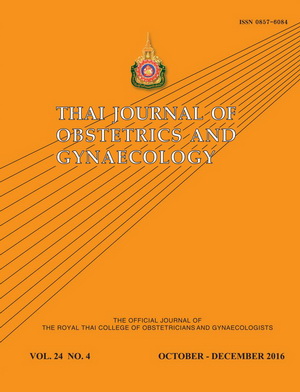Factors Associated with Meconium Aspiration Syndrome in Cases with Meconium-Stained Amniotic Fluid
Main Article Content
Abstract
Objective: To determine the factors associated with meconium aspiration syndrome (MAS) in cases with meconium-stained amniotic fluid (MSAF) at Chonburi Hospital.
Materials and methods: Singleton pregnancies delivered at Chonburi Hospital with vertex presentation with MSAF during the 15 May 2011 – 15 May 2014 period were reviewed. These pregnancies included women who delivered at or beyond 24 weeks of gestation or birth weight at least 700 grams but excluded those who delivered infants with lethal congenital abnormalities. They were divided into 2 groups depending on whether the neonates developed MAS or not. The two groups were compared retrospectively regarding baseline characteristics, and then binary logistic regression analysis was used to identify independent significant factors associated with MAS.
Results: Among 776 pregnancies who met the inclusion criteria, 111 neonates developed MAS, 665 neonates did not. Thick meconium, abnormal external fetal monitoring, non-vigorous newborn, Apgar score at 1 minute less than or equal to 7, and low birth weight were significantly associated with MAS (p<0.05). By the binary logistic regression analysis; thick meconium, non-vigorous newborn, and Apgar score at 1 minute less than or equal to 7 remained statistically significant (OR 4.82, 95% CI 2.86-8.14, OR 5.87, 95% CI 2.84-12.13 and OR 3.23, 95% CI 1.60-6.54, respectively).
Conclusion: Thick meconium, non-vigorous newborn and Apgar score at 1 minute less than or equal to 7 were associated with MAS in MSAF


